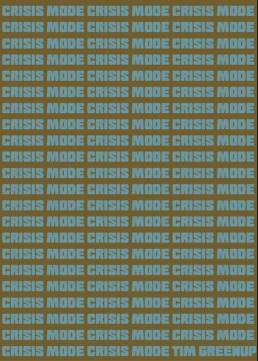By Greg Bem

Terminal Goals by Mark Anderson
At HappyCorp™, we pride ourselves on indulging our guests’ most unrealistic fantasies by providing the highest quality guest service experience.
(page 1)
Former Spokane poet laureate and performance poet Mark Anderson’s Terminal Goals is a fast-paced portrait of desire and violence. It is a movement through prose to the discovery of the shadow side of technical abundance in an age of machine learning, cybernetic intelligence, and the supreme value of the robotic other. In this short text, Anderson explores what current technology has to say about humanity’s everlasting flaws and its drive toward supreme power.
[SMILES SMILES SMILES SMILES as far as the eye can see in an ocean of blood SMILES SIMLES SMILES SMILES]
(page 3)
The book is divided into several parts and focuses on a fantasy land of escape that plays on one of our most absurd commodities: the cruise vacation. Other writers have spent many pages describing the pitiable and exquisite cruise, including David Foster Wallace in an infamous piece for Harper’s. In Anderson’s take, the latest cruise ship concept is a getaway managed by “HappyCorp™,” a seemingly perfect operation that knows what its customers want and how to deliver. The cruise is run by an organization and its mysteries carry it idealistically. In addition to its classic escapist symbolism, Anderson’s boat contains AI-infused robots that are available for customers’ pleasure. Everything we could want to do to humans is made ethically available in Anderson’s speculative romp.
Trauma transformed me into a master of language.
(page 13)
As with any dystopian literary sandbox, the protagonist’s slow spiral into delirium throughout Terminal Goals starts with the ability to jump on a cruise with little effort (leaving significant other behind to communicate long-distance). Once situated, it is a mere feedback mechanism toward escalation of violence and comfort. The protagonist is situated in a space where the stakes get higher and the pleasure gets even more so. When, at last, the protagonist is scheduled to leave, there is one more option to keep paying and playing. The stunning climax is a classic science fiction parable for the age of ChatGPT, internet pornography, and the stress of living as cogs in the mediocre machine.
Picture me as an incomprehensible arachnid crawling out of the sea on eight throbbing, red limbs, searching for my creator.
(page 13)
You can find the book here: https://bottlecap.press/products/goals

CRISIS MODE by Tim Greenup
Spokane Poet and English Professor Tim Greenup brings additional layers of life’s feelings of powerlessness and captivity into view in a short but long-lasting collection of poems. CRISIS MODE is, on the surface, a charming look at the daily goings-on of a life in Washington State’s second largest city. But across the sequence we find disdain, dissatisfaction, and fractures of identity and being.
Like other “working poets” like Joe Hall and Ryan Eckes, Tim Greenup’s experiences of daily life and daily labor finds subtle absurdities across lines and pages. The book opens “I walk through a snowy wood // in search of ambition,” a clever establishing of shadow and longing within the opening shot. Later in the same poem on the same page, one of Greenup’s many motifs, that of otherness centered within familiarity, appears: “Shadows will no longer be // shadows but the way of things, and then I’ll / be the strange one with skin and worries // being ripped apart by the cold power of this / place” (page 13).
Greenup’s poems are far from disturbing or shocking. The poet here plays a long game that relies on a gymnastic rhetoric filled with revelations of disappointment and monotony. One poem reads: “On the cold walk home, Sam and I / slapped construction signs, yelped / into a blank sky.” (page 18) and on the following page the next poem reads: “You ask your friend to carry you down, / but they too are ruined by the sound / and can move no further.” (page 19). Most of this world’s elements are filled with nihilistic devices and in Greenup’s scene each transition, each translation, each repositioning of time and space represents another hurdle, another barrier, another sluggish moment of pause, of interruption.
As a book of experiences by way of introduction, I am reminded of Whinnie the Pooh and Kafka and the many writers who have been subdued and incapacitated by the everyday. Greenup is particularly eloquent in reflecting on circumstance through image and metaphor. Indeed, the Kafkaesque nightmare that is mild and prolonged may even be referenced to in “The air around you”:
A black beetle in the slimey folds of your brain
convinces you to behave this way.
(page 25)
At Greenup’s most surreal, the world still feels familiar and present, hardly removed from the shared human experience, the trite and pathetic conditions that surround that experience. At least Greenup gives us joyful language through which the shadowy epiphanies and reflections can take place.
You can find the book here: https://burnsidereview.org/chapbooks-crisis-mode.html
Greg Bem is a poet and librarian living on the sacred and unceded land of the Spokane Tribe: South Hill, Spokane, Washington. He writes book reviews for Rain Taxi, Exacting Clam, The International Examiner, and more. He is a proud union supporter and finds many of his hours stretched across mountains and water bodies. Learn more at gregbem.com.
,
,
One comment